| Srl | Item |
| 1 |
ID:
052100
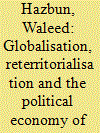

|
|
|
|
|
| Publication |
Summer 2004.
|
| Summary/Abstract |
major limitation of most political economy studies of globalisation is that they view globalisation almost exclusively in terms of deterritorialisation. This essay, in contrast, emphasises how increases in the transnational mobility of people, capital and information can also result in reterritorialisation, which is the increased relevance of location and characteristics of place for global economic activity. In contrast to the erosion of the territorially based powers of nation-states often associated with deterritorialisation, the reterritorialisation of economic activity can increase the power and regulatory influence of state, societal and transnational agents who are able to exert control over territorial assets and the reterritorialisation process. The essay uses the concepts of deterritorialisation and reterritorialisation to develop a framework to analyse the changing political economy of one of the most understudied aspects of globalisation, the international tourism economy. With a focus on the development strategies of states in the Middle East and North Africa, the essay explores efforts to generate 'experiences of place' for tourists and territorial-based economic rewards for firms and their political consequences.
|
|
|
|
|
|
|
|
|
|
|
|
|
|
|
|
| 2 |
ID:
142175
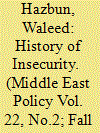

|
|
|
|
|
| Summary/Abstract |
In recent decades, scholars of the Middle East have come to understand that the long-dominant neorealist approaches, with their focus on the relative material power of states, fail to explain the dynamics of security politics in the region. As Gregory Gause explains, Arab states “have overwhelmingly identified ideological and political threats…to the domestic stability of their ruling regimes as more salient than threats based upon aggregate power, geographic proximity and offensive capabilities.” While Gause refers to threats “emanating from abroad,” others have highlighted that the primary function of security policy in Arab states is to secure the interests and power of the ruling regimes from ideological and political threats that emanate from within the territory of the state.
|
|
|
|
|
|
|
|
|
|
|
|
|
|
|
|
| 3 |
ID:
153941
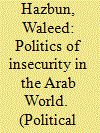

|
|
|
| 4 |
ID:
096865
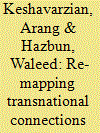

|
|
|
| 5 |
ID:
096867
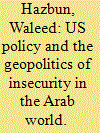

|
|
|
|
|
| Publication |
2010.
|
| Summary/Abstract |
In the wake of 9/11, President George W. Bush downplayed traditional 'realist' security concerns by defining America's goal as countering threats generated by the internal characteristics of Arab societies. Bush advanced a strategy of regional transformation based on regime change in Iraq and economic, social, and political reform across the Arab world. This strategy, however, failed to address the security interests of regional governments while generating insecurity for Arab societies. To explain these results, the article develops a framework for understanding the Middle East regional system that recognises the role of societal discourses of insecurity and the system's multipolar structure. The framework is used to suggest an alternative strategy for US Middle East policy. Rejecting both a renewed project of regional transformation and a return to neorealism, the paper outlines a strategy based on managing a multipolar, pluralist system.
|
|
|
|
|
|
|
|
|
|
|
|
|
|
|
|
| 6 |
ID:
189693
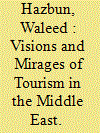

|
|
|
|
|
| Summary/Abstract |
After years of disruption from war and the pandemic, tourism in the region is rebounding, with the Gulf states emerging as leading destinations. But sustainability remains elusive.
|
|
|
|
|
|
|
|
|
|
|
|
|
|
|
|